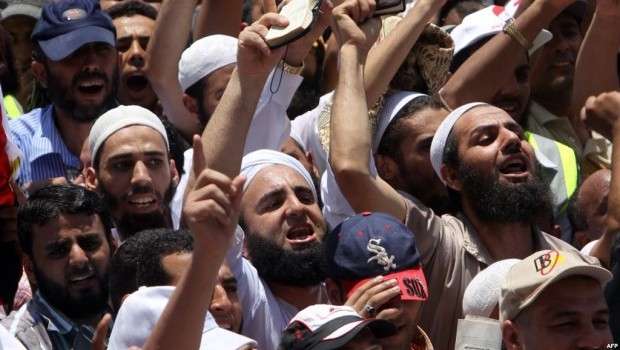
(AFP File Photo)
Committee to Protect the Democratic Path held a meeting with representatives from several political parties on Monday in the first round of societal dialogue over the draft protest law. The conferees agreed that such a law must be issued by an elected parliament.
The National Defence Council (NDC) announced that a societal dialogue should be held to discuss the controversial Protest Law, which was approved by the cabinet on 10 October.
Deputy Prime Minister and Minister of International Cooperation Ziad Bahaa Al-Din announced in a press statement that the Committee to Protect the Democratic Path met with representatives from Al-Dostour, Al-Nour, Misr Al-Qawia, Free Egyptians, Egyptian Social Democratic Party, Al-Karama, Egyptian Current, Misr Al-Hurreya and Al-Adl parties, representatives from the Tamarod (Rebellion) Campaign, Al-Tayar Al-Sha’aby coalition as well as other politicians, in the presence of committee rapporteur Ezzedine Choukry.
According to the statement, the conferees acknowledged “the difficult security issues the country is dealing with” but they agreed that the timing regarding the issuance of the law is not convenient, as “such a law that affects personal rights and freedoms should be issued from an elected parliament.”
They also agreed that the Protest Law should be issued in the context of an integrated programme for transitional justice, including enhancing the performance of security forces in dealing with protests.
Bahaa Al-Din’s statement read that the conferees stated some flaws in the draft law, including “restricting the right to protest, which is one of the most important gains of the 25 January Revolution” and placing more bureaucratic burdens on the Ministry of Interior.
The statement concluded with the plan that the Committee to Protect Democratic Path will go on with meetings with political factions to discuss transitional justice programs and the post-30 June roadmap.
Former parliament member Mostafa Al-Naggar conveyed the same message in a press statement he issued.
Al-Naggar said that he was “surprised” during the meeting with “a worse draft of the law”. He also compared the issuance of this law to the “disastrous constitutional decree [issued by ousted President Mohamed Morsi] that we all rejected.”
Al-Naggar said: “The trials to restrict people’s freedoms under the calls of fulfilling security should be combated fiercely.”
Free Egyptians Party spokesman Shehab Wagih said that the Protest Law should be issued by an elected parliament, especially that “the current regime legitimacy stems from protests and sit-ins, thus it can’t restrict that right.”
However, Wagih added that the party acknowledges the tough security situation Egypt faces, “but such a situation can be combated with the currently existing-normal or exceptional- laws.”
The draft protest law stirred criticism that dubbed it as restrictive to personal rights.



